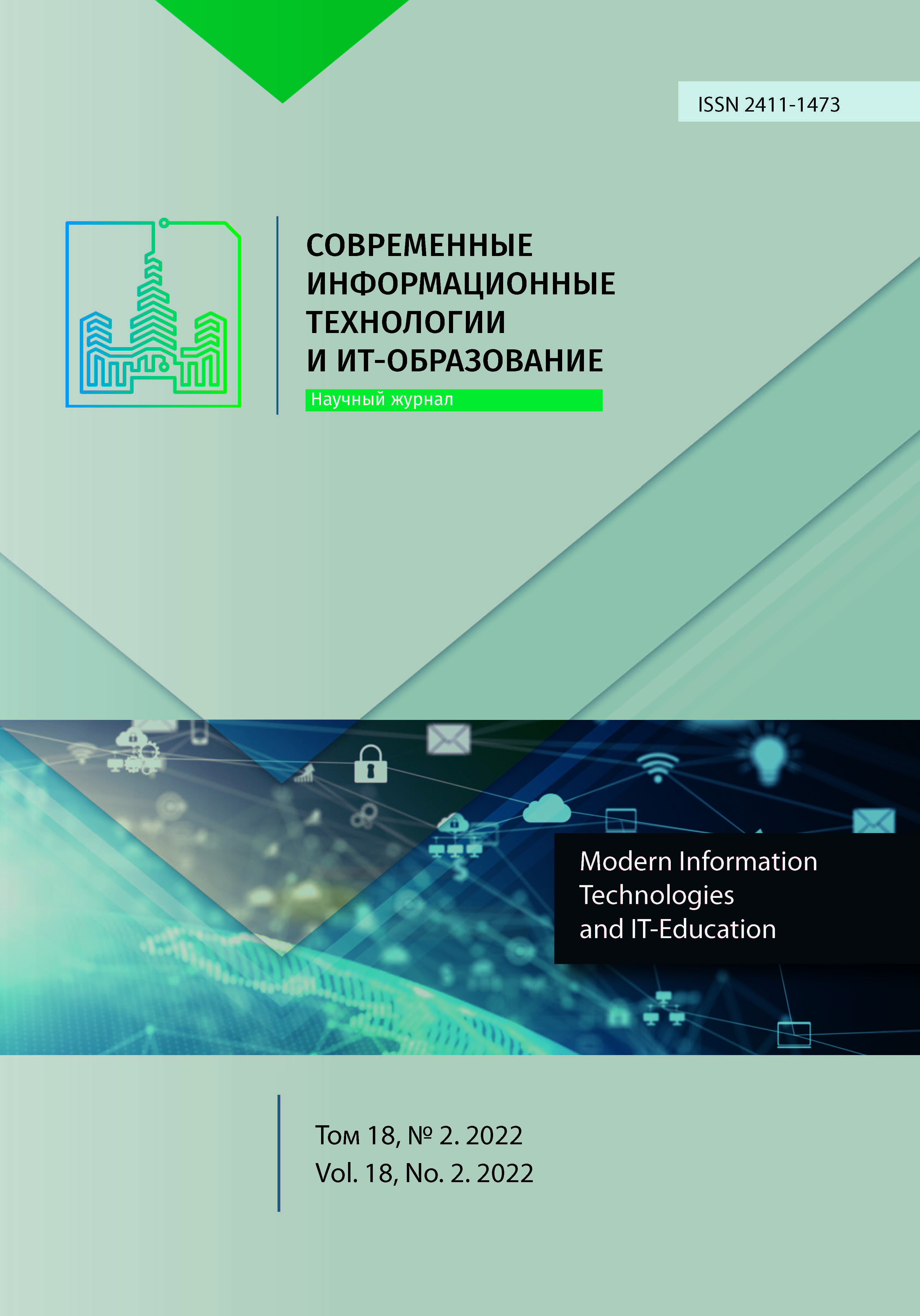Эмуляторы квантовых компьютеров на кубитах и на кудитах
Аннотация
словами изложены основные идеи, лежащие в основе квантовых вычислений. Также освещается тема квантовых компьютеров на основе кубитов - многомерных аналогов кубитов, которым в последнее время уделяется большое внимание благодаря их эффективности. Вводятся основы квантовой механики, которые необходимы для понимания принципов работы квантового компьютера, такие понятия, как кубиты и кудиты, линейные операторы, процесс измерения и т.д. В качестве примера квантовых вычислений подробно анализируются принцип работы алгоритма Дойча-Йожа, одного из первых квантовых алгоритмов, продемонстрировавшего свои преимущества, и его обобщение на кудиты. Пошагово описан процесс написания простейшего эмулятора квантового компьютера на языке программирования Python. Эмулятор работает с произвольным количеством кубитов и позволяет применять к ним произвольные операторы и проводить множественные измерения конечного состояния кубита. После этого дается обобщение этого эмулятора для работы с кудитами. Чтобы продемонстрировать написанный нами эмулятор, мы представляем программы, реализующие алгоритм Дойча-Йожа и его обобщения на нем, и тестируем их.
Литература
2. Baskakov P.E., Khabovets Y.Yu., Pilipenko I.A., Kravchenko V.O., Cherkesova L.V. Tools for Performing and Emulating Quantum Computing. Vestnik Novosibirskogo gosudarstvennogo universiteta. Seriâ: informacionnye tehnologii v obrazovanii = Vestnik NSU. Series: Information Technologies. 2020; 18(2):43-53. (In Russ., abstract in Eng.) https://doi.org/10.25205/1818-7900-2020-18-2-43-53
3. Kiktenko E.O., Nikolaeva A.S., Fedorov A.K. Quantum computing using multilevel quantum systems. Nanoindustry. 2020; 13(S4):649-651. (In Russ., abstract in Eng.) doi: https://doi.org/10.22184/1993-8578.2020.13.4s.649.651
4. Smirnova T.S., Shvetskiy M.V. A visual emulator of the Bloch vector and sphere as a means of teaching quantum computing. The Scientific Opinion. 2021; (9):76-82. (In Russ., abstract in Eng.) doi: https://doi.org/10.25807/22224378_2021_9_76
5. Grigoryeva G.M., Khodchenkov V.Yu. On the possibility of building a quantum computer emulator using XMM registers. Sistemy komp’yuternoj matematiki i ih prilozheniya = Computer Mathematics Systems and Their Applications. 2021; (22):113-116. Available at: https://www.elibrary.ru/item.asp?id=46649884 (accessed 16.03.2022). (In Russ., abstract in Eng.)
6. Arute F., Arya K., Babbush R., et al. Quantum supremacy using a programmable superconducting processor. Nature. 2019; 574:505-510. (In Eng.) doi: https://doi.org/10.1038/s41586-019-1666-5
7. Guzik V.P., Gushanskiy S.M. Development of emulator for quantum computers. Izvestiya SFedU. Engineering Sciences. 2010; (2):73-79. Available at: https://www.elibrary.ru/item.asp?id=13617268 (accessed 16.03.2022). (In Russ., abstract in Eng.)
8. Solovyev V.M. Quantum Computers and Quantum Algorithms. Part 1. Quantum Computers. Izvestiya of Saratov University. New Series. Series: Mathematics. Mechanics. Informatics. 2015; 15(4):462-477. (In Russ., abstract in Eng.) doi: https://doi.org/10.18500/1816-9791-2015-15-4-462-477
9. Solovyev V.M. Quantum Computers and Quantum Algorithms. Part 2. Quantum Algorithms. Izvestiya of Saratov University. New Series. Series: Mathematics. Mechanics. Informatics. 2016; 16(1):104-112. (In Russ., abstract in Eng.) doi: https://doi.org/10.18500/1816-9791-2016-16-1-104-112
10. Ladd T., Jelezko F., Laflamme R., et al. Quantum computers. Nature. 2010; 464:45-53. (In Eng.) doi: https://doi.org/10.1038/nature08812
11. Kiktenko E.O., Fedorov A.K., Man'ko O.V., Man'ko V.I. Multilevel superconducting circuits as two-qubit systems: Operations, state preparation, and entropic inequalities. Physical Review A. 2015; 91(4):042312. (In Eng.) doi: https://doi.org/10.1103/PhysRevA.91.042312
12. Imany P., Jaramillo-Villegas J.A., Alshaykh M.S., et al. High-dimensional optical quantum logic in large operational spaces. npj Quantum Information. 2019; 5:59. (In Eng.) doi: https://doi.org/10.1038/s41534-019-0173-8
13. Wang Y., Hu Z., Sanders B.C., Kais S. Qudits and High-Dimensional Quantum Computing. Frontiers in Physics. 2020; 8:589504. (In Eng.) doi: https://doi.org/10.3389/fphy.2020.589504
14. Kiktenko E.O., Nikolaeva A.S., Xu P., Shlyapnikov G.V., Fedorov A.K. Scalable quantum computing with qudits on a graph. Physical Review A. 2020; 101(2):022304. (In Eng.) doi: https://doi.org/10.1103/PhysRevA.101.022304
15. Moreno-Pineda E., Godfrin C., Balestro F., Wernsdorfer W., Ruben M. Molecular spin qudits for quantum algorithms. Chemical Society Reviews. 2018; 47(2), 501-513. (In Eng.) doi: https://doi.org/10.1039/C5CS00933B
16. Ringbauer M., Meth M., Postler L., Stricker R., Blatt R., Schindler P., Monz T. A universal qudit quantum processor with trapped ions. Nature Physics. 2022; 18:1053-1057. (In Eng.) doi: https://doi.org/10.1038/s41567-022-01658-0
17. Tacchino F., Chiesa A., Sessoli R., Tavernelli I., Carretta S. A proposal for using molecular spin qudits as quantum simulators of light–matter interactions. Journal of Materials Chemistry C. 2021; 9(32):10266-10275. (In Eng.) doi: https://doi.org/10.1039/D1TC00851J
18. Lu H.H., Hu Z., Alshaykh M.S., Moore A.J., Wang Y., Imany P., Weiner A.M., Kais S. Quantum Phase Estimation with Time-Frequency Qudits in a Single Photon. Advanced Quantum Technologies. 2020; 3(2):1900074. (In Eng.) doi: https://doi.org/10.1002/qute.201900074
19. Fischer L.E., Chiesa A., Tacchino F., Egger D.J., Carretta S., Tavernelli I. Towards universal gate synthesis and error correction in transmon qudits. arXiv:2212.04496. 2022. (In Eng.) doi: https://doi.org/10.48550/arXiv.2212.04496
20. Chi Y., Huang J., Zhang Z., et al. A programmable qudit-based quantum processor. Nature Communications. 2022; 13:1166. (In Eng.) doi: https://doi.org/10.1038/s41467-022-28767-x
21. Brennen G.K., O'Leary D.P., Bullock S.S. Criteria for exact qudit universality. Physical Review A. 2005; 71(5):052318. (In Eng.) doi: https://doi.org/10.1103/PhysRevA.71.052318
22. Biamonte J., Wittek P., Pancotti N., et al. Quantum machine learning. Nature. 2017; 549:195-202. (In Eng.) doi: https://doi.org/10.1038/nature23474
23. Aryte F., Arya K., Babbush R., et al. Quantum supremacy using a programmable supercon-ducting processor. Nature. 2019; 574:505-510. (In Eng.) doi: https://doi.org/10.1038/s41586-019-1666-5
24. Deutsch D., Jozsa R. Rapid Solution of Problems by Quantum Computation. Proceedings of the Royal Society A: Mathematical, Physical and Engineering Sciences. 1992; 439(1907):553-558. (In Eng.) doi: https://doi.org/10.1098/rspa.1992.0167
25. Fan Y. A Generalization of the Deutsch-Jozsa Algorithm to Multi-Valued Quantum Logic. 37th International Symposium on Multiple-Valued Logic (ISMVL'07). IEEE Computer Society, Oslo, Norway; 2007. p. 1-5. (In Eng.) doi: https://doi.org/10.1109/ISMVL.2007.3

Это произведение доступно по лицензии Creative Commons «Attribution» («Атрибуция») 4.0 Всемирная.
Редакционная политика журнала основывается на традиционных этических принципах российской научной периодики и строится с учетом этических норм работы редакторов и издателей, закрепленных в Кодексе поведения и руководящих принципах наилучшей практики для редактора журнала (Code of Conduct and Best Practice Guidelines for Journal Editors) и Кодексе поведения для издателя журнала (Code of Conduct for Journal Publishers), разработанных Комитетом по публикационной этике - Committee on Publication Ethics (COPE). В процессе издательской деятельности редколлегия журнала руководствуется международными правилами охраны авторского права, нормами действующего законодательства РФ, международными издательскими стандартами и обязательной ссылке на первоисточник.
Журнал позволяет авторам сохранять авторское право без ограничений. Журнал позволяет авторам сохранить права на публикацию без ограничений.
Издательская политика в области авторского права и архивирования определяются «зеленым цветом» в базе данных SHERPA/RoMEO.
Все статьи распространяются на условиях лицензии Creative Commons «Attribution» («Атрибуция») 4.0 Всемирная, которая позволяет другим использовать, распространять, дополнять эту работу с обязательной ссылкой на оригинальную работу и публикацию в этом журналe.













